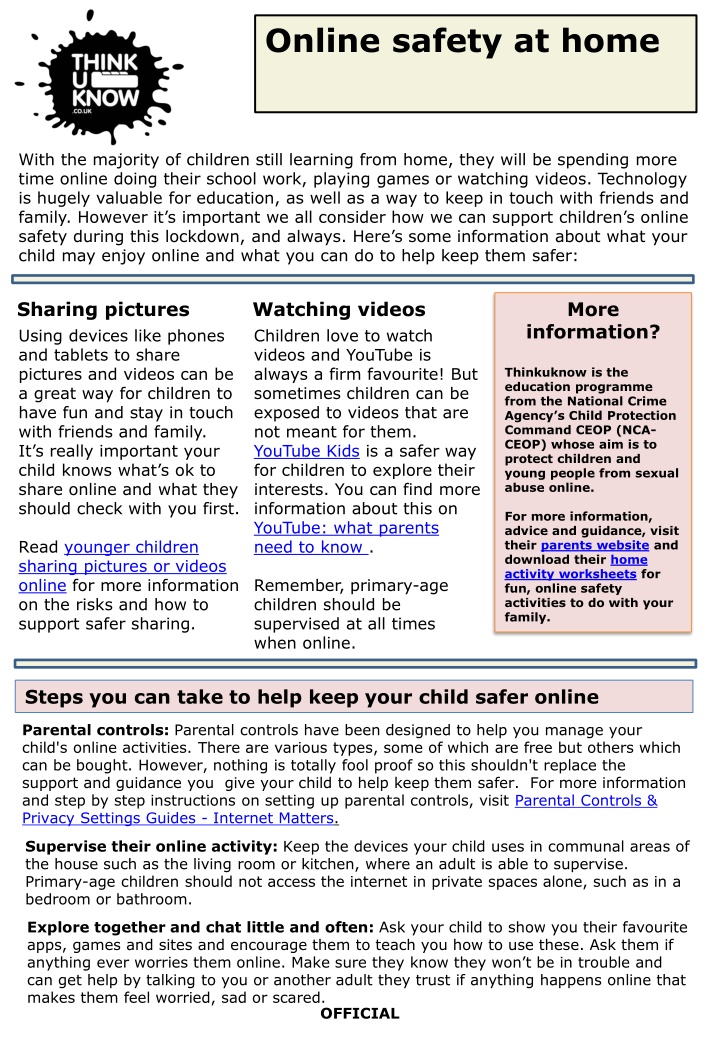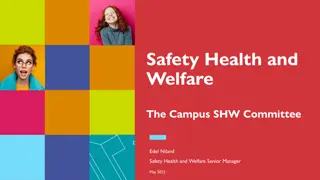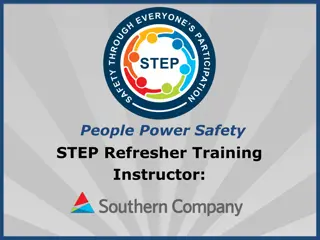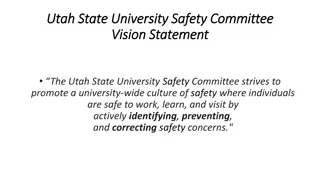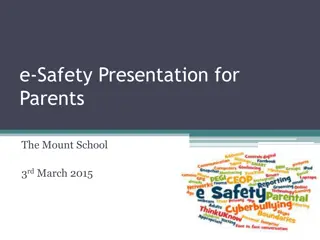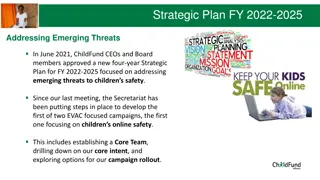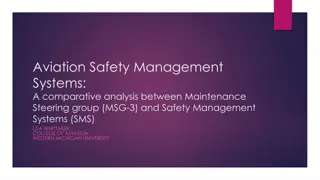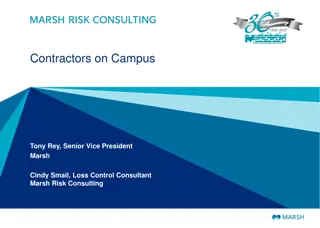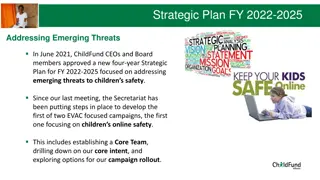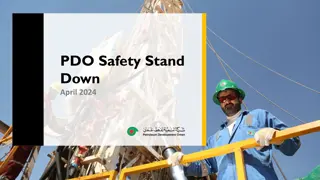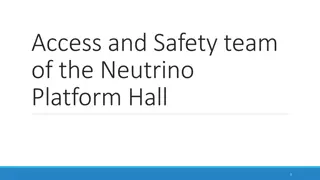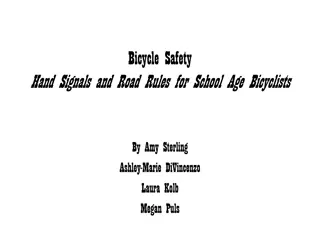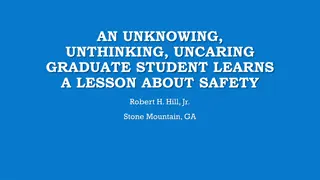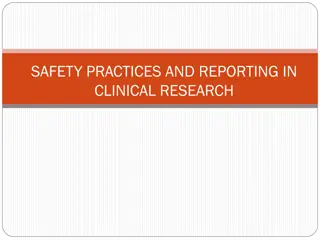Ensuring Online Safety for Children Learning from Home
With children spending more time online for school work, games, and videos during lockdown, it is crucial to prioritize their online safety. This includes monitoring their activities, setting up parental controls, and educating them on safe practices. Resources like YouTube Kids and Thinkuknow can aid in safeguarding children from potential online risks.
Download Presentation

Please find below an Image/Link to download the presentation.
The content on the website is provided AS IS for your information and personal use only. It may not be sold, licensed, or shared on other websites without obtaining consent from the author.If you encounter any issues during the download, it is possible that the publisher has removed the file from their server.
You are allowed to download the files provided on this website for personal or commercial use, subject to the condition that they are used lawfully. All files are the property of their respective owners.
The content on the website is provided AS IS for your information and personal use only. It may not be sold, licensed, or shared on other websites without obtaining consent from the author.
E N D
Presentation Transcript
OFFICIAL Online safety at home With the majority of children still learning from home, they will be spending more time online doing their school work, playing games or watching videos. Technology is hugely valuable for education, as well as a way to keep in touch with friends and family. However it s important we all consider how we can support children s online safety during this lockdown, and always. Here s some information about what your child may enjoy online and what you can do to help keep them safer: Sharing pictures Using devices like phones and tablets to share pictures and videos can be a great way for children to have fun and stay in touch with friends and family. It s really important your child knows what s ok to share online and what they should check with you first. Watching videos Children love to watch videos and YouTube is always a firm favourite! But sometimes children can be exposed to videos that are not meant for them. YouTube Kids is a safer way for children to explore their interests. You can find more information about this on YouTube: what parents need to know . More information? Thinkuknow is the education programme from the National Crime Agency s Child Protection Command CEOP (NCA- CEOP) whose aim is to protect children and young people from sexual abuse online. For more information, advice and guidance, visit their parents website and download their home activity worksheets for fun, online safety activities to do with your family. Read younger children sharing pictures or videos online for more information on the risks and how to support safer sharing. Remember, primary-age children should be supervised at all times when online. Steps you can take to help keep your child safer online Parental controls: Parental controls have been designed to help you manage your child's online activities. There are various types, some of which are free but others which can be bought. However, nothing is totally fool proof so this shouldn't replace the support and guidance you give your child to help keep them safer. For more information and step by step instructions on setting up parental controls, visit Parental Controls & Privacy Settings Guides - Internet Matters. Supervise their online activity: Keep the devices your child uses in communal areas of the house such as the living room or kitchen, where an adult is able to supervise. Primary-age children should not access the internet in private spaces alone, such as in a bedroom or bathroom. Explore together and chat little and often: Ask your child to show you their favourite apps, games and sites and encourage them to teach you how to use these. Ask them if anything ever worries them online. Make sure they know they won t be in trouble and can get help by talking to you or another adult they trust if anything happens online that makes them feel worried, sad or scared. OFFICIAL
OFFICIAL Watching Videos and Online Gaming Watching videos From animals doing funny things, to slime-making and game-tutorials, the internet has lots of fun videos for children to enjoy. But the amount and availability of content online means that children may see something inappropriate. The internet is a public and open space where anyone can post and share content. This can be fun and entertaining for children, but it does mean your child may see something that is intended for adults. Children love to watch videos and YouTube is always a firm favourite! But sometimes children can be exposed to videos that are not meant for them. YouTube Kids is a safer way for children to explore their interests. You can find more information about this on YouTube: what parents need to know . Find out what to do if you're worried your child might see something inappropriate online or what to do if they already have. To understand what type of content might not be suitable and advice on how to help your child watch safely, watch this short video guide. Remember, primary-age children should be supervised at all times when online. Online gaming Gaming is popular with both children and adults and can help to cure that lockdown boredom! If your child is gaming, you may have some questions about how to keep them safer. If so, check out - gaming: what parents need to know. The PEGI (Pan European Game Information) rating system can be a useful tool to help you decide what online games are appropriate for your child. Online games are social activities, and most have features that allow children to chat with others whilst they play. For information about the positives of gaming, the risks of in-game chat and measures you can take to help protect them, watch this short video: In-game chat: a guide for parents and carers . For more information on the PEGI system and other factors to consider before deciding what s suitable, read Gaming: what's appropriate for your child For a guide on the apps, sites and games your child might enjoy, visit: Net Aware. OFFICIAL
OFFICIAL Chatting and Sharing Information Chatting, being kind and making friends online Primary-age children may not have previously had much experience with video chatting apps such as zoom, FaceTime and Skype, but may well be using them now for education or to keep in touch with family and friends. The term online friend can be used to describe people you only know through the internet, or those that you also know offline. Some children make friends online by meeting new people through online platforms such as gaming sites. The internet has many positive opportunities for children to learn and play, but it can also be used in negative and unkind ways. It s really important to speak to your child about being kind online, and how they can get help if they see or hear anything that makes them feel worried, scared or sad. Use these conversation starters to help your child understand the importance of being kind online. To make sure your child has a positive experience video chatting online, read this guide for parents and carers To help children have positive online friendships, read this handy guide. Sharing information, pictures and videos It s harder to stay connected with our friends and family right now, so you may be sharing more images and videos of our children online via social media. But before you do, there are some important things to consider. Using devices like phones and tablets to share pictures and videos can be a fun way for children to have fun and stay in touch with friends and family online. It s really important your child knows what s ok to share online and what they should check with you first. Personal information is any information that can be used to identify your child. Sharing personal information online is easy and sometimes children, like adults, might share more online than they would offline, which can be risky. Read sharing pictures of your children for info on how to protect your younger, or older child whilst staying social. Read younger children sharing pictures or videos online for more information on the risks and how to support safer sharing. Read your child's personal information and how to protect it online for information and advice. OFFICIAL
OFFICIAL Steps you can take to help keep your child safer online Parental controls: Parental controls have been designed to help you manage your child's online activities. There are various types, some of which are free but others which can be bought. However, nothing is totally fool proof so they shouldn't replace the need for you to support and advise your child using the internet. For more information and step by step instructions on setting up parental controls, visit Parental Controls & Privacy Settings Guides - Internet Matters. Supervise their online activity: Keep the devices your child uses in communal areas of the house such as the living room or kitchen, where an adult is able to supervise. Primary-age children should not access the internet in private spaces alone, such as in a bedroom or bathroom. Explore together and chat little and often: Ask your child to show you their favourite apps, games and sites and encourage them to teach you how to use these. Ask them if anything ever worries them online. Make sure they know they won t be in trouble and can get help by talking to you or another adult they trust if anything happens online that makes them feel worried, sad or scared. Make sure they know where to go for support: Remind your child they can always speak to you or an adult they trust if anything happens online that makes them feel worried or upset. For a breakdown of report services, visit: Supporting your child with reporting unwanted content online Take a look at Thinkuknow: Thinkuknow is the national online safety education programme from the National Crime Agency. Thinkuknow offers learning activities, advice and support for children and young people aged 4-18 and their families. The Jessie & Friends animations for 4 to 7s will help you start a conversation about online safety and for 8-10 s, there s the Play Like Share animations and the Band Runner game and advice website . Help your child identify trusted adults who can help them if they are worried: This includes you and other adults at home, as well as adults from wider family, school or other support services who they are able to contact at this time. Encourage them to draw a picture or write a list of their trusted adults. Talk about how their online actions affect others: If your child is engaging with others online, remind them to consider how someone else might feel before they post or share something. If they are considering sharing a photo/video of somebody else, they should always ask permission first. Use SafeSearch : Most web search engines will have a SafeSearch function, which will allow you to limit the content your child can access whilst online. Look out for the Settings button on your web browser homepage, which is often shaped like a small cog. Visit Thinkuknow.co.uk/parents for more information on keeping your child safer online. OFFICIAL
